Press statement of President Emomali Rahmon following Tajikistani — Russian talks
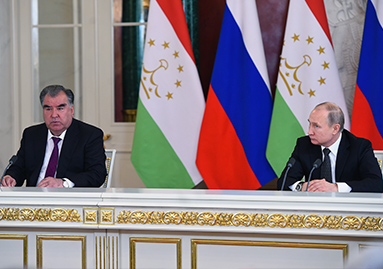
17.04.2019, Russia
Ladies and gentlemen,
First of all, I would like to once again express my sincere gratitude to the Russian side for the invitation to come to friendly Russia on an official visit. Regular dialogue at the highest level allows us to not only substantively discuss the current issues and prospects of our strategic partnership, but also to thoroughly exchange views on regional and international matters.
Following today’s talks, an important package of bilateral documents was signed. Economic cooperation is the core of our partnership, so special attention was paid to trade and economic issues and investment cooperation.
Russia remains one of Tajikistan’s main trade and economic partners today. Last year, trade between our countries grew by 9 percent exceeding $1 billion. In this context, the further effective implementation of decisions made by the Intergovernmental Commission on Economic Cooperation is especially important.
The Tajik side has reaffirmed the importance of implementing promising investment projects in the real sector of Tajikistan’s economy. We are focusing on establishing joint ventures in the consumer goods, food and mining industries, as well as in transport and tourism.
There are also great opportunities for cooperation in the fuel and energy and agriculture sectors in Tajikistan. Today we have signed documents on simplifying customs procedures for goods and vehicles moving between our countries and on the procedure and standards for phytosanitary control. These documents build the legal framework for a “green corridor,” thereby creating favourable conditions for the mutual supply of goods, including environmentally friendly Tajik vegetables and fruit, to the vast Russian market. We also noted the need for the early completion of the preparatory work for establishing a wholesale distribution centre for agricultural products in Tajikistan.
Interregional ties, which are constantly expanding in geographical scope, are another important element of the two countries’ economic cooperation. As of today, about 80 Russian regions have direct trade, economic, cultural and other ties with Tajikistan. We believe it necessary to further expand and promote cooperation in this sphere.
Today the economy in Tajikistan is developing steadily, and annual GDP growth has remained at seven percent for the last 10 years, which is a good macroeconomic indicator. We have set ourselves the goal to move our economy to an industrial and agricultural development model in the next 10 years. This will create new opportunities to develop mutually beneficial cooperation between regions, in various industrial sectors.
Both sides have focused on cooperation in labour migration, with the primary goal of regulating migration between our countries and improving the living and working conditions of Tajikistani labour migrants and their families in Russia.
Thanks to our joint efforts we have made marked progressed in addressing pressing issues in this sphere. It is noteworthy that in recent years, the number of labour migrants entering Russia from Tajikistan has been decreasing.
For example, last year about 480,000 citizens of Tajikistan came to Russia for work, which is 50 percent less than the peak in the first years of this decade, when up to one million labour migrants moved to Russia. However, there are still unresolved issues in this area that demand our attention.
We have discussed further ways to promote bilateral cooperation in culture, science, education and tourism. I would like to note that the Russian information space covers all regions of Tajikistan, which means it is part of our information space, too.
Russian education and the Russian language are in an increasingly strong position in our country. Today, there are over 20,000 young people from Tajikistan studying at Russian universities. The Russia-Tajikistan Slavonic University and branches of leading Moscow universities such as the Lomonosov Moscow State University, the National University of Science and Technology MISiS (NUST MISiS) and the Moscow Power Engineering Institute, are successfully operating in Tajikistan as well.
In accordance with relevant Presidential executive orders and Government resolutions, compulsory Russian language classes were introduced in general education institutions starting from second grade. Many pre-school institutions offer education in Russian. Ten universities have Russian philology or Russian language and literature departments. The country has dozens of general education schools as well as hundreds of classes that offer education in Russian. Therefore, we are grateful that Russia is prepared to accelerate the process of building five new Russian-language schools in Tajikistan.
We commend the results of our countries’ cooperation in the sphere of countering global threats. In the field of security, we closely cooperate to combat terrorism, extremism, transnational organised crime and drug trafficking. Tajikistan and Russia are natural allies on this front, and we support further coordination of our competent departments’ actions in this area.
Military-technical cooperation between Tajikistan and Russia is developing successfully. We are thankful for Russia’s continuous assistance in training personnel for our armed forces and in strengthening Tajikistan’s defense capabilities from the military-technical standpoint.
Tajikistan is taking measures necessary for Russia’s largest foreign military facility, the 201stmilitary base, to operate effectively. The unique Okno [Window] optical electronic complex is successfully carrying out its mission, too.
We view the presence of the 201st military base in Tajikistan as a key factor in collective efforts to ensure regional security. Afghanistan related issues are the focus of discussions on regional security. Events in Afghanistan directly affect the security level in our country and in the whole region. It should be noted that Tajikistan accounts for about 60 percent of the former USSR’s border with Afghanistan, this is 1,400 kilometres of the Tajik-Afghan border in difficult to control mountainous areas.
The Tajik-Afghan section of the border is strategically significant in terms of ensuring security in the southern border area of the commonwealth. Tajikistan, which buffers security threats from that direction, makes a strong contribution to effectively countering them.
Experience has shown that the problems in this neighbouring country have no military solution. Tajikistan is interested in a stable and prosperous Afghanistan and calls for peaceful solutions to its problems.
In this respect, we talked about further joint efforts to assist in the restoration of peace and stability in Afghanistan through political and diplomatic means. We had a substantive exchange of views on regional and international issues. President Putin and I called for stepping up our collaboration within the UN, OSCE, SCO, CIS, CSTO and other multilateral cooperation organisations.
Tajikistan is satisfied with the results of today’s talks. I was very happy to use this opportunity to invite Mr President to visit Tajikistan at his convenience.
Once again, thank you very much, Mr President, and the people of Russia as represented by you, for the warm reception and traditional hospitality.
Thank you very much.











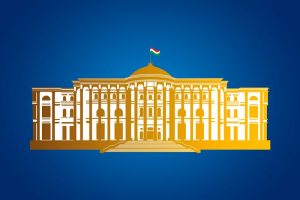 President Emomali Rahmon to Hold a Series of High-Level Meetings in the Coming Days
President Emomali Rahmon to Hold a Series of High-Level Meetings in the Coming Days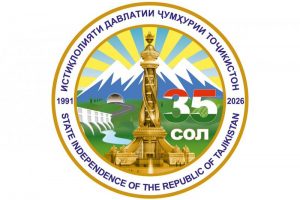 President Emomali Rahmon Approves Emblem for the 35th Anniversary of Tajikistan’s State Independence
President Emomali Rahmon Approves Emblem for the 35th Anniversary of Tajikistan’s State Independence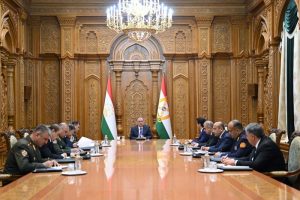 President Emomali Rahmon Holds Working Meeting with Heads of Security and Law Enforcement Agencies
President Emomali Rahmon Holds Working Meeting with Heads of Security and Law Enforcement Agencies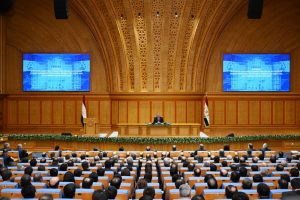 Expanded meeting of the Government of the Republic of Tajikistan
Expanded meeting of the Government of the Republic of Tajikistan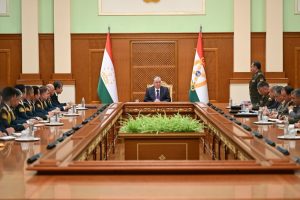 President Emomali Rahmon makes personnel appointments
President Emomali Rahmon makes personnel appointments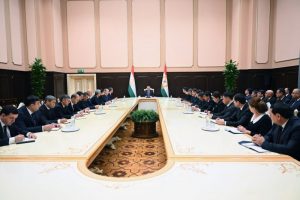 President Emomali Rahmon makes personnel changes in the structures of the Supreme Court, the Higher Economic Court, the Ministry of Foreign Affairs
President Emomali Rahmon makes personnel changes in the structures of the Supreme Court, the Higher Economic Court, the Ministry of Foreign Affairs President Emomali Rahmon makes personnel appointments in the structures of the Ministry of Internal Affairs
President Emomali Rahmon makes personnel appointments in the structures of the Ministry of Internal Affairs President Emomali Rahmon makes personnel appointments
President Emomali Rahmon makes personnel appointments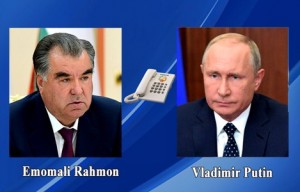 Emomali Rahmon, Vladimir Putin discuss strengthening strategic partnership between two countries
Emomali Rahmon, Vladimir Putin discuss strengthening strategic partnership between two countries














